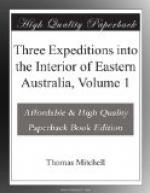Interior waters.
Here I at length drank the water of a stream, which flowed into the unexplored interior; and from a hill near our route I beheld, this day, for the first time, a distant blue horizon, exactly resembling that of the ocean.
December 6.
Liverpool plains.
At an early hour we continued the journey towards the plains, guided by the natives, and along a cart track, which led towards some cattle stations. We crossed a low ridge of rich earth, in which were embedded nodules of limestone, and fragments of trap-rock. After passing several extremities of ridges, of a similar description, all being branches from high ranges on our left, we came upon a portion of the plains. This expanse of open level country, extended in a northerly direction, as far as human vision could reach; and being clear of trees, presented a remarkable contrast to the settled districts of the colony. The soil of these plains looked rich, the grass was good, and herds of cattle browsing at a distance, added pastoral beauty, to that which had been recently a desert.
Proposed route.
We now turned from the track, we had thus far followed in a west-south-west direction, and parting from our friends, the natives, who insisted on our keeping the track, we again entered the woods, by turning a little to the north. My object, in proceeding in this direction, was to reach the bank of Peel’s river at Wallawoul; that stream having been laid down as holding a northerly course, and consequently I had reason to believe that it would lead to any greater river flowing to the north-west, as reported by The Barber. But independently of this consideration, it was expedient to travel along its right bank, which commanded access to the high ranges on the east, and would therefore secure the party from any danger of obstruction from floods. I soon came on another path, and a line of marked trees, which a native, whom I met, said was the road from Palmer’s to Loder’s station. We next arrived at a deep dry bed, which in wet seasons must be filled by a very considerable stream, but in that time of drought, it was not until after riding up and down a considerable distance in search of water, that I at length found some ponds. The native name of this channel is Nuzabella. We crossed its bed, in order to encamp at a shady spot, where the long grass had been burnt a short while before. In other parts the grass reached to the heads of the horses, and at this time was so liable to catch fire, and was so frequently set on fire by the natives, that with our stock of ammunition, the situation of the camp required particular attention. The bullocks were much fatigued with this day’s journey, the thermometer having stood at 96 degrees in the shade, and at sunset, and even during part of the night, it was as high as 90 degrees.
Horses astray.




